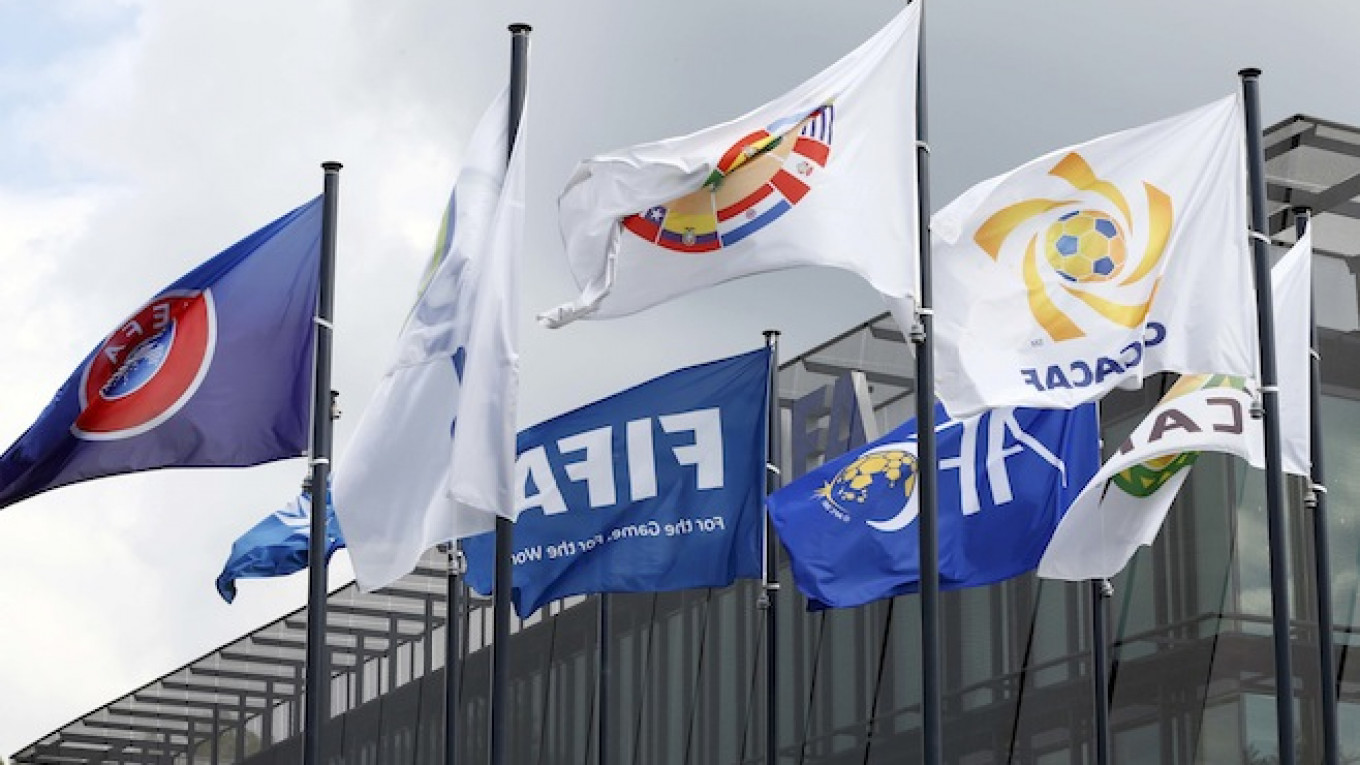Most Russians think that corruption allegations against officials at FIFA, football's governing body, leveled by U.S. investigators last month are an attempt to prevent Russia from hosting the 2018 World Cup, according to a survey published Wednesday by state-run pollster VTsIOM.
A total of 65 percent of respondents said that the work of the FBI was an “attempt to pressure Russia and obstruct the World Cup in Russia,” according to VTsIOM.
Seven FIFA officials were arrested in Switzerland last month as the organization gathered to elect a new president as a result of a U.S. Justice Department investigation into racketeering, wire fraud and money laundering. Another seven defendants have been indicted in the case.
A popular perception that politics is the reason for the U.S. probe chimes with statements made by President Vladimir Putin and other Russian officials, who accuse the United States of trying to dominate the world. Anti-U.S. rhetoric from officials, and in state-controlled media, has intensified as ties between Russia and the West have deteriorated over the Ukraine crisis, which began in early 2014.
“The arrests look, to say the very least, really strange. … It is clearly yet another attempt [by the U.S.] to spread its jurisdiction to other states,” Putin said in an interview on May 28.
Russian Sports Minister Vitaly Mutko, who is also on FIFA's executive committee, echoed Putin's criticism of the United States' role in the arrests. “For some reason they come to Europe to arrest people,” he said last month.
He noted that FIFA's continental federation in the United States is headquartered in Miami. “They could have arrested them there,” Mutko said.
Moscow officials have tended to avoid mentioning a parallel probe into FIFA officials launched by Swiss investigators last month looking at possible wrongdoing in the allocation of the 2018 World Cup to Russia and the 2022 tournament to the oil-rich Gulf state of Qatar.
The U.S. investigation is not explicitly looking at the voting procedure for the allocation of the World Cup.
In their questions to respondents, VTsIOM elided the U.S. and Swiss investigations, stating that the FBI had accused the detained FIFA officials of vote-buying to rig the awarding of the World Cup to Russia.
Both Russia and FIFA have said that the criminal inquiries against FIFA will not have any impact on Russia's status as the host of the tournament, which is set to take place between June 14 and July 15.
The survey, which involved 1,600 people and had a margin of error of 3.5 percent, also showed that 65 percent of Russians think the World Cup was awarded fairly and honestly to Russia while just 13 percent believed the voting procedure was likely tainted by violations.
U.S. investigators said this week that they have been eyeing corruption at FIFA since as early as 2011, when they signed an agreement with senior FIFA official Chuck Blazer, who pleaded guilty to bribery and money laundering charges, to pass on information about FIFA, the BBC Sport news site reported Tuesday.
Russia was awarded the 2018 World Cup in 2010 after a bidding campaign marred by allegations of bribe-taking, spying and vote-rigging. An investigation was carried out for FIFA by former U.S. Federal Prosecutor Michael Garcia into allegations of wrongdoing, but FIFA refused to publish Garcia's report, citing legal concerns. Garcia rejected the ruling and resigned.
Swiss prosecutors, who have seized around nine terabytes of data so far in connection with the case, said Wednesday that their investigation was independent of the U.S. probe and they were unconcerned about any impact their work might have on Russia's hosting of the 2018 tournament, the Reuters news agency reported.
Contact the author at h.amos@imedia.ru
A Message from The Moscow Times:
Dear readers,
We are facing unprecedented challenges. Russia's Prosecutor General's Office has designated The Moscow Times as an "undesirable" organization, criminalizing our work and putting our staff at risk of prosecution. This follows our earlier unjust labeling as a "foreign agent."
These actions are direct attempts to silence independent journalism in Russia. The authorities claim our work "discredits the decisions of the Russian leadership." We see things differently: we strive to provide accurate, unbiased reporting on Russia.
We, the journalists of The Moscow Times, refuse to be silenced. But to continue our work, we need your help.
Your support, no matter how small, makes a world of difference. If you can, please support us monthly starting from just $2. It's quick to set up, and every contribution makes a significant impact.
By supporting The Moscow Times, you're defending open, independent journalism in the face of repression. Thank you for standing with us.
Remind me later.







